Unit 2 Body language Grammer
致用英语综合教程unit2[精品]
![致用英语综合教程unit2[精品]](https://img.taocdn.com/s3/m/577792074531b90d6c85ec3a87c24028915f85d5.png)
Unit 2 Knowing our bodyTeaching objectivesAfter learning this unit, Ss will learn how to✧Describe the body parts✧Talk about the functions of the body parts✧Use comparatives and superlatives✧Use the body languageTeaching focusGrammar: comparatives and superlativesV ocabulary building: Name of body parts; base adjectives and strong adjectivesImportant words and phrases: attempt, wonder, sight, blind, stump,quest,couple, smart, hurt, shock, confusion, lesson, reply, selfish, sympatheticTeaching difficulties1. Understanding the structure and main idea of the text.2. Grammar: comparatives and superlativesTeaching ProceduresI. Warming-up questions:What knowledge of human body do you get from the documentary film? Which parts of human body does the documentary mention? (Y ou can skim through new words before l i steni ng.)II. Listening and speaking (1 period)a.This is a lead-in to the listening part. Before playing the recording, askstudents to read the questions. Then play the recording and encounrage students to take notes while listening.anize a speaking activity based on the listening material. First ask Ss toform groups and have a discusssion about which is the mose imortant bosy part. Then ask Ss to role-paly the dialogue in the listening part. Remind them they may use their own language.III. Reading 4 periods1.Pre-reading tasks:Before you read, discuss the foll owi ng questi ons i n groups:a. Has any part of your body ever been injured? If yes, what inconveniences did it cause?Work in groups and share your experiences.b. Have you ever read or heard stories about body parts?2.Reading comprehensiona.Ask Ss to read the text first and then answer the questions in Comprehension Check.b.In this sextion,you may organize a class discussion based on the article students have just studied. This discussion activity is necessary for language learners. They should be able to and present their own experiences after they have received the input information.3.Detailed learning of the textLanguage points※attemptn. an act of trying to do something, especially something difficulte.g. She passed her driving test at the first attempt.v. to try to do something, especially something difficulte.g. He attempted to open the door.He attempted to lie.※stump v.1)if you are stumped by a question or problem, you are unable to find an answer to ite.g. The doctors were stumped and had to call in a specialist.The police were stumped about the motivebehind the murder.(警方给难住了,无法查明这次谋杀的动机。
英语八年级下册-Unit2课件(含答案)
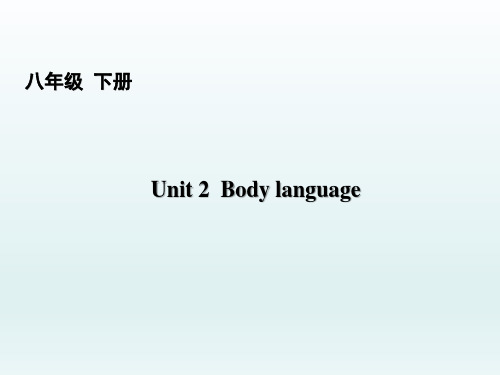
7. When we meet friends, we often __s_h_a_k_e____ hands. 8. I am ____su__re______ he will make it. 9. When we ____n_o_d____, it means we say yes. 10. He walked ___t_o_w_a_r_d_s_____ the classroom.
C. believe
( B )4. —What happened last night? —Nothing took place.
A. came
B. happened C. went
( A )5. —Where did they go at last? —They went to the park instead of going to the library.
man he wanted. He told him to ___9___ the ring for himself. “You have done so well in this little thing,” said he.“That now I know I can ___10___ you with many things.”
A. remind; of B. remind; for C. help; remind
( C )12. —Sometimes ________ language is the way you sit and stand.
—OK. I understand.
A. spoken
B. written
C. body
二、词汇测试
i. 从下面每小题的A、B、C三个选项中选出可以替换画 线部分的最佳选项。
Unit2.Body language教案

Unit2. Body language(教学设计)一、教学目标:1、知识目标The Ss can grasp the words and expressions.The Ss can grasp the grammar and use it correctly.The Ss can improve their ability of listening, speaking, reading and writing.2、能力目标To make conversations about making or rejecting suggestions.To write a note according to one requirement.To learn the importance of body language in western cultures.3.、情感目标To use body language correctly in our daily life.To admire different cultures and behave politely.二、教学重点难点:1、V ocabulary2、Key sentences3、Grammar三、教学设计理念1、本单元的教学活动始终遵循任务型教学的教学理念,以学生为学习的主体,以任务为中心,在运用语言完成任务的过程中来学习,体会和掌握语言。
2、始终贯彻学以致用的原则(在做中学,在学中用)。
3、在教学过程中,关注学生的生活实际和生活体验,让其贴近实际、贴近生活,树立以学生为本的思想,提倡学生参与、体验、亲身实践、独立思考、合作探究,从而实现教学方式和学习方式的转变。
四、教学工具:多媒体课件,录音机,图片等五、教学步骤:Step 1 Warming up (课前热身---- 激发学习兴趣)Use pictures to talk about gestures and expressions.Step 2 Presentation1. Words and expressions(引导学生回忆) Do you know the meaning of the words?(出示课件——复习词汇和短语,结合构词法和中考真题)2. Key sentencesHelp the Ss grasp them and can grasp how to use the sentence patterns or phrases.(利用课件展示key sentences,边讲边练)3. GrammarEmphasize the importance of the Gerunds.Lead the Ss revise and summarize the usage .(通过课件强调语法——动名词,以及动名词作主语和作宾语的用法,结合中考真题练习)4. WritingUse a note as an example to explain how to write.Let them enjoy the good sentences and wonderful expressions.Step 3.DiscussionTalk about how to behave politely when using body language.(分组合作,选出代表总结观点)Conclusion: Smile is welcomed all over the world.Step4. ListeningA song to relax and practice listening skills.Step5. Homework1 . Summarize the unit yourselves and do self-check to make sure you have learned all.2. Preview next unit (words & background ).3. Write a telephone message .4. Collect some interesting materials about body language .。
2019年1819 Unit 2 Section Ⅲ Grammar——名词性从句Ⅱ与it作形式主语语文
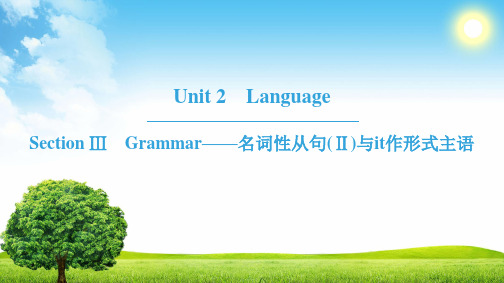
点
拨
返 首 页
语
境
自
主
二、it 用作形式主语
领
悟
当不定式、动名词、从句等用作主语时,为避免头重脚轻,通常在句首使
随 堂
效
用形式主语 it,而把真正的主语放在句子末尾。
果 落
语 法
1.代替主语从句
实
精
要
it 代替主语从句的常用句式如下:
点
拨
返 首 页
语
境 自
(1)It be+名词(a pity, a shame, an honour, a good idea, a miracle, a fact,
果
分,这时 what 具有两个含义:
语
落 实
法 精
①保留疑问的意义,即“什么;什么样的”;
要
点 拨
②相当于“the thing(s) that/which”,即“先行词+定语从句”的含义。
返 首 页
语
另外,what 的此种用法还可以表示时间(the time that)、地点(the place that)、
He didn't attend the meeting.That was because he was ill.他没出席会议。那是
因为他生病了。
返 首 页
语
境
自
主
(4)同位语从句
领
悟
随
I have no idea where he has gone.
堂
效
我不知道他去哪里了。
果
落
语 法
We don't understand the problem why this is the best choice.我们不明白这个 实
牛津译林版高中英语选修8精品学案Unit 2 The universal languageGrammar
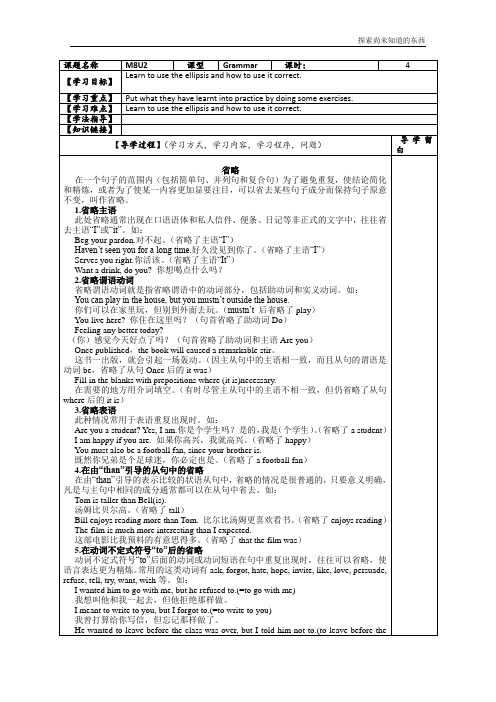
class was over) 他要在下课前离开,但我告诉他不要那样做。
6.在疑问词后的省略who, which, when, where, why, how, what等疑问词在引导从句时,其后的成分如与句子中出现的成分相同,往往可以省去。
如:Someone has cleaned the classroom, but I don’t know who.(=who has cleaned the classroom)有人打扫了教室,但我并不知道是谁。
They are going abroad soon, but I don’t know when.(=when they are going abroad)他们不久就要出国了,但我不知道具体时间。
7.在复合句中的省略复合句中某些成分省略的情形也是很多的。
在回答问题时我们常这样说:1)—Can you come with your husband this afternoon?今天下午你和你丈夫能一道来吗?—I am afraid not.恐怕不能。
(=I am afraid that I can not come with my husband this afternoon.) 2)—Shall I make a copy of it?我是否复制一份?—Yes, if time permits.是的。
如时间容许,请复制一份。
(Yes, please make a copy of it if time permits.)8.有时“so”可用来代替一个从句,或从句的一部分,而把这一部分省略。
如:1)—Is he coming back tonight?他是否今晚回来?—I guess so. 我想是这样。
(代替He is coming back tonight.)2)—She may not be free today. 她今天下午可能没时间。
—If so, we’ll have to put th e meeting off. 如果那样的话,我们必须把会议推迟。
2019外研版高中英语选择性必修二Unit2 Using language 课件

Using language
Grammar: Past perfect passive
Look at the sentences and answer the questions. Sentence (a) is from the reading passage.
Grammar: Past perfect passive Complete Jack’s blog post with the correct form of the verbs in brackets.
So, 7. _to__m_a_k_e_ (make) sure you do your homework, put it second or third on your to-do list, not at the top. Then put one or two really hard things you don’t want to do at the top of the list. You will procrastinate to avoid the hard stuff — by doing your homework!
Grammar: Past perfect passive
Work in pairs. Talk about what had happened before you started a new habit of your own. Use the past perfect passive where appropriate.
1. The car had been damaged by the flood water. 2. The task had been completed before noon yesterday.
高中英语 Unit 21《Body Language》说课稿 新人教版必修1
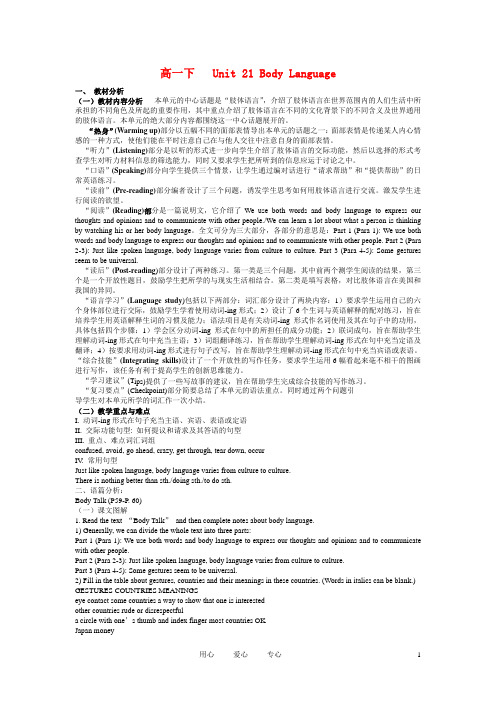
高一下 Unit 21 Body Language一、教材分析(一)教材内容分析本单元的中心话题是“肢体语言”,介绍了肢体语言在世界范围内的人们生活中所承担的不同角色及所起的重要作用,其中重点介绍了肢体语言在不同的文化背景下的不同含义及世界通用的肢体语言。
本单元的绝大部分内容都围绕这一中心话题展开的。
“热身”(Warming up)部分以五幅不同的面部表情导出本单元的话题之一:面部表情是传递某人内心情感的一种方式,使他们能在平时注意自己在与他人交往中注意自身的面部表情。
“听力”(Listening)部分是以听的形式进一步向学生介绍了肢体语言的交际功能,然后以选择的形式考查学生对听力材料信息的筛选能力,同时又要求学生把所听到的信息应运于讨论之中。
“口语”(Speaking)部分向学生提供三个情景,让学生通过编对话进行“请求帮助”和“提供帮助”的日常英语练习。
“读前”(Pre-reading)部分编者设计了三个问题,诱发学生思考如何用肢体语言进行交流。
激发学生进行阅读的欲望。
“阅读”(Reading)部分是一篇说明文,它介绍了We use both words and body language to express our thoughts and opinions and to communicate with other people./We can learn a lot about what a person is thinking by watching his or her body language。
全文可分为三大部分,各部分的意思是:Part 1 (Para 1): We use both words and body language to express our thoughts and opinions and to communicate with other people. Part 2 (Para 2-3): Just like spoken language, body language varies from culture to culture. Part 3 (Para 4-5): Some gestures seem to be universal.“读后”(Post-reading)部分设计了两种练习。
大学进阶英语教材2答案

大学进阶英语教材2答案Unit 1: VocabularyExercise 11. conscious2. artificial3. perceive4. function5. unique6. estimate7. peculiar8. communicate9. abstract10. fundamentalExercise 21. instinctively2. breakthrough3. inefficient4. prospective5. essentially6. consequently7. supposedly8. accurately9. extensively10. profoundlyUnit 2: ReadingExercise 1: Multiple Choice1. B2. A3. D4. C5. BExercise 2: True or False1. True2. False3. True4. True5. FalseUnit 3: ListeningExercise 1: Short Answer1. To present the latest research findings.2. They are less aware of their surroundings.3. Similar capacities for language processing.4. To assess cognitive abilities.5. Technology's impact on language learning. Exercise 2: Multiple Choice1. B2. D3. C4. A5. CUnit 4: GrammarExercise 11. Has been studying2. Will be watching3. Have been working4. Won't have arrived5. Was playingExercise 21. hadn't met2. should have reported3. will be living4. have been traveling5. could have boughtUnit 5: WritingQuestion 1In my opinion, the key to a successful business lies in effective communication. In today's global market, businesses are dealing with customers and partners from different cultural backgrounds. Therefore, being able to communicate clearly and concisely is crucial.One effective way to improve communication skills is by practicing active listening. This involves paying full attention to the speaker and showing genuine interest in the conversation. By listening actively, one can better understand the other person's perspective and respond accordingly.Another important aspect of communication is non-verbal cues. Body language, facial expressions, and gestures can all convey messages that words alone cannot. It is essential to be aware of these non-verbal cues and use them effectively to enhance communication.Furthermore, written communication skills are also vital in today's digital age. Whether it's an email, a report, or a presentation, being able toexpress ideas clearly and concisely in writing is necessary for effective communication in business.In conclusion, effective communication is the cornerstone of a successful business. By practicing active listening, utilizing non-verbal cues, and honing written communication skills, individuals can improve their ability to communicate efficiently and achieve success in the business world.Question 2Dear Professor,I am writing to request an extension for the deadline of the upcoming assignment. Due to unforeseen circumstances, I have been facing numerous challenges that have hindered my progress in completing the assignment on time.I understand the importance of meeting deadlines and take full responsibility for the delay. However, I believe that acquiring additional time will allow me to produce a high-quality assignment that meets the required standards.I assure you that I am committed to completing the assignment to the best of my abilities and will submit it as soon as possible with the extended deadline.Thank you for your understanding regarding this matter. I appreciate your consideration and look forward to your favorable response.Sincerely,[Your Name]。
高中英语动词时态完整版

Unit 1 Body Language Grammar: Review of tenses时态概念:英语中作谓语的动词用来表示该动作在不同的时间里发生或存在的状态的各种形式。
英语总共又16种时态,中学英语主要又9种时态。
以动词Work 为例时态用法:1.一般现在时态用法一般现在时态练习题:2.一般过去时态的用法:一般过去时态练习题:3.一般将来时态的用法:一般将来时态表示法:1)Shall / will + do 表示不含主观因素,单纯表示将来。
My birthday is coming, I shall be 19 years old.2)be going to do 表示计划安排好的动作。
或根据目前的情况判断某事即将发生,意为“将要,就要”。
Look at the black clouds. It is going to rain.He is going to swim this afternoon.3)be to do 表示“正式安排”要在将来做的事,意为“预定”,常用于通知,规定,正式的命令或指示。
The meeting is to be held on Friday morning.The president is to hold an official reception for the visitors.4)be about to do 表示即刻就要发生的动作。
后面一般不接将来时间状语。
I was about to go out, when the telephone rang.Come on , the check-in desk I about to close.5) 一些瞬间动词的一般现在时,现在进行时或将来进行时可表示计划或将要发生的动作。
常用的动词有 go , come, strat, arrive, return, begin, leave, sail, move.Our summer holiday begins in three days.The professor is giving a talk this afternoon.6) be due to +动词原形,表示“定于(某时做某事)常与时间状语连用。
Unit2GrammarandusageIntegratedskills英汉互译讲义-高中英语牛津译

Unit 2 grammar and usage & Integrated skills英汉互译(Page 20)Passive voice in the past continuous and past perfect tensesA Exploring the rulesNicole wrote a blog post about the city half-marathon she took part in. Find the sentences that use the passive voice in the past continuous and past perfect tenses and fill in the table below. The first one has been done for you.My heart was beating rapidly in my chest as I found a shady place to rest my tired body. My cheeks were red, and I could hear myself breathing heavily as I looked up at the blue sky. When my breathing returned to normal, I reflected on what had just been achieved. Six weeks ago, my friends told me that a city half-marathon for amateurs was being organized to help raise money for charity, and encouraged me to take part. Despite my lack of running experience, I agreed. In order not to hurt my knees or ankles, I started my training very gently by running just one kilometre on the first day. Over the next six weeks, I gradually increased the distance I ran in each training session and also made sure to allow my body enough time to rest and recover after each run. Soon I was running distances I had never thought possible. The day of the half-marathon finally arrived and I felt well prepared. I ate a hearty breakfast so I knew I could get through to the end. I ran my race relaxed and confident, even though my limits were being tested like never before. I was happy to learn that a lot of money had been raised for charity.(Page 21)B2 Jessica gave an account of her experience as a volunteer for the city half-marathon.Complete the passage with the correct forms of the verbs in the box below.By the time Cathy and I, together with other volunteers for the city half-marathon, arrived at 4:30 a.m., tables (1)had been placed on both sides of the road. Bottles of water and paper cups (2)were being carried to different tables, so Cathy and I immediately went to help. Then, we took our place at the table and quickly started to arrange the bottles and cups so that they looked like an army of soldiers standing in line for inspection. I took a step back, and looked at the scene with satisfaction. For the previous couple of weeks, I (3)had (been) trained on how to be a volunteer for the half-marathon. I decided to volunteer for this year’s half-marathon after the chairman of the organizing committee visited my school. We were told that the competitors would be raising money for charity, and while I didn’t feel that I had a strong constitution to run that far, I thought the next best thing would be to help those who could. After all the preparations (4)had been made/were made, the exciting half-marathon began. Cathy and I waited patiently until word spread that the first runners would be arriving soon. As the tired, thirsty runners ran along, they (5)were being cheered by the crowds. Cathy and I quickly poured water into the cups for them. After the last runner passed, I found paper cups and plastic bottles everywhere. The litter (6)was being blown around by the wind as I bent over to pick up a plastic bottle. Cathy and I started clearing up. We were tired and wet with sweat but it felt really good to know that we had been able to help(Page 23)Integrated skillsSharing your understanding of sportsmanshipB Daniel has found a website article about fair play. Read the article below and answer the following questions.Winning isn’t everythingWe all know what it is like to want to win and most of us know what it is like to lose. More often than not, winning has the victor walking on air, lost in the glory of the moment, while the loser is left with a bitter taste and a feeling of failure. Almost nobody likes to come second, and sometimes it is difficult to keep everything in perspective. Modern society honours winners and successful sportspeople quickly become celebrities, admired by all. However, there are ways to win and ways to lose. Whether you come first or last, it is important to remember that at any sporting event, you face two opponents: your fellow competitors and yourself. At the finish, your competitors will walk away but you will have to live with your decisions. A true sportsperson will make the right decisions for the right reasons and not worry about failure. There is an old and very wise saying, repeated many times, “Win with humility, lose with grace,In praise of such acts of sportsmanship, the International Fair Play Committee decided to award the Pierre de Coubertin Fair Play Trophy, in 1964. The first athlete to receive the award was an Italian bobsleigh competitor named Eugenio Monti. During the two-man bobsleigh final at the 1964 Winter Olympic Games, he produced an excellent time for his downhill run. One of the British competitors, Tony Nash, had broken a part of his bobsleigh and was unable to compete. Monti became aware of this, and without hesitation, he removed the same part of his own bobsleigh and lent it to his opponent. Nash and his partner went on to achieve a record time and won the goldmedal. Monti’s remarkable, unselfish decision to help a fellow competitor, in the final stage of an Olympic event, is an example to us all. He did not come first but he walked。
Unit2语法Grammar简单句并列句主从复合句-高一英语单元重难点易错题精练(译林版2020)
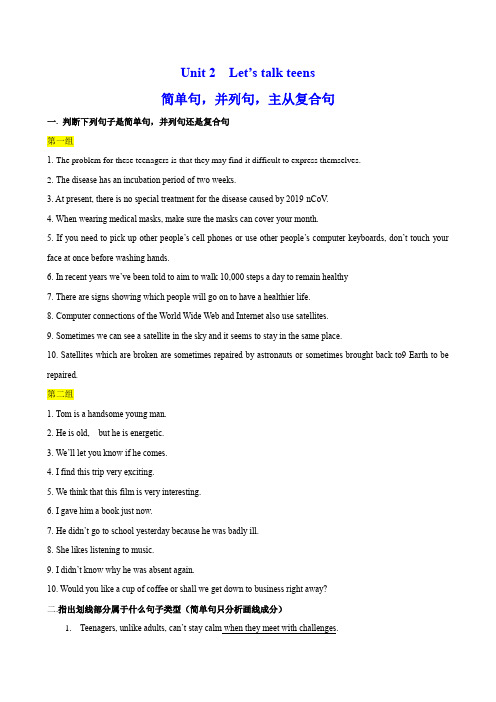
Unit 2Let’s talk teens简单句,并列句,主从复合句一. 判断下列句子是简单句,并列句还是复合句第一组1. The problem for these teenagers is that they may find it difficult to express themselves.2. The disease has an incubation period of two weeks.3. At present, there is no special treatment for the disease caused by 2019-nCoV.4. When wearing medical masks, make sure the masks can cover your month.5. If you need to pick up other people’s cell phones or use other people’s computer keyboards, don’t touch your face at once before washing hands.6. In recent years we’ve been told to aim to walk 10,000 steps a day to remain healthy7. There are signs showing which people will go on to have a healthier life.8. Computer connections of the World Wide Web and Internet also use satellites.9. Sometimes we can see a satellite in the sky and it seems to stay in the same place.10. Satellites which are broken are sometimes repaired by astronauts or sometimes brought back to9 Earth to be repaired.第二组1. Tom is a handsome young man.2. He is old, but he is energetic.3. We’ll let you know if he comes.4. I find this trip very exciting.5. We think that this film is very interesting.6. I gave him a book just now.7. He didn’t go to school yesterday because he was badly ill.8. She likes listening to music.9. I didn’t know why he was absent again.10. Would you like a cup of coffee or shall we get down to business right away?二.指出划线部分属于什么句子类型(简单句只分析画线成分)1.Teenagers, unlike adults, can’t stay calm when they meet with challenges.2.The pressure of study added the tension to me, and I felt anxious.3.Jack’s concern over his studies may lead to a mental breakdown.4.The first thing that we need to do is calm them down.5.These students have a desire to get normal and regular mental guidance.6.The editor argued that there was a failure in our education.7.From my point of view, I don’t quite see eye to eye with the editor on this matter.8.There is an argument in today’s newspaper which is about the problem of teenagers.9.He had to back down because it was a tough task.10.If we want the children to shoot up healthily, we must struggle to win the rough battle.11.It is wrong that some parents regard their children as targets of anger.12.A real nest is likely to be built on a roof, but this is a grand and unique building.13.At the forum, experts said that they didn’t like the design of the Bird’s Nest.14.The Bird’s Nest is a stadium where you can watch sports or art performances.15.As soon as the travelers finally arrived at the spot, they cheered up.16.The youth are so fond of adventure that they are eager to explore the unknown.17.The guide volunteered to gather information about kangaroos in Australia.18.There are both challenges and opportunities for us graduates.19.After they graduate, many youths are pressed to find jobs.20.Even if the rent is high, I choose to live in a flat downtown.三.根据要求改写句子1.Mathematics is the base for other sciences. It is known to all of us.(改成含有that引导的主语从句的复合句)2.You would disagree with my decision. It never occurred to me.(改成含有that引导的主语从句的复合句)3.What do you think of our plan? Please let me know.(改成含有宾语从句的复合句)4.The plan to build new offices should be carried out immediately. That is my idea.(改成含有表语从句的复合句)5.The man is my uncle. The man has an umbrella in his hand.(改成含有定语从句的复合句)6.We don’t take immediate action. The situation will get worse.(改成含有条件状语从句的复合句)7.He didn’t pass the driving test. He didn’t practice enough.(改成含有原因状语从句的复合句)8.She is somewhat thinner than desirable. She is in good health. (改成含有让步状语从句的复合句)四.阅读短文,指出划线句子是什么句子结构How to keep healthyWhat is the most important thing in the world? ①I think it is health.①You can take away our money, house, car, or even our clothes and we can survive. But if our health was taken away, we would surely die. That is why we always try to eat in a healthy way and exercise regularly.In order to eat healthily, I usually avoid eating food high in fat, like French fries or cookies. ①I also eat little meat. I eat a lot of vegetables and fresh fruit which are full of vitamins.①Taking exercise every day helps us build a strong body. Regular exercise is an important part of keeping me healthy.What's more, I think friends are an important part of one's health. Many studies show that people with a wide range of social contacts get sick less than those who don't. ①I always feel better when I am with friends than when I am alone. When I am with my friends, I always laugh. Laughing is also an important part of health. I like to laugh with my friendBy eating properly and exercising regularly, ①I can keep my body at a proper weight and keep healthy. By spending time with my friends, I can keep my mind as well as my body happy. ①These things sound easy to do, but not many people can manage them. I think a strong will is necessary if we want to keep healthy.答案第一组1. The problem for these teenagers is that they may find it difficult to express themselves.主从复合句: that引导的表语从句2. The disease has an incubation period of two weeks.简单句:一个主语,一个谓语动词3. At present, there is no special treatment for the disease caused by 2019-nCoV.存现句4. When wearing medical masks, make sure the masks can cover your month.主从复合句:when引导的时间状语从句5. If you need to pick up other people’s cell phones or use other people’s computer keyboards, don’t touch your face at once before washing hands.主从复合句:if引导条件状语从句6. In recent years we’ve been told to aim to walk 10,000 steps a day to remain healthy.简单句:一个主语,一个谓语动词7. There are signs showing which people will go on to have a healthier life.存现句8. Computer connections of the World Wide Web and Internet also use satellites.存现句9. Sometimes we can see a satellite in the sky and it seems to stay in the same place.并列句:两个主语分别对应两个谓语10. Satellites which are broken are sometimes repaired by astronauts or sometimes brought back to9 Earth to be repaired.主从复合句:which引导的定语从句第二组1.简单句2.并列句3.主从复合句4.简单句5.主从复合句6.简单句7.主从复合句8.简单句9.主从复合句10.并列句二.1.时间状语从句2.并列句3.定语4.定语从句5.定语6.宾语从句7.状语8.定语从句9.原因状语从句10.条件状语从句11.主语从句12.并列句13.宾语从句14.定语从句15.时间状语从句16.结果状语从句17.定语18.同位语19.时间状语从句20.让步状语从句三.1.That mathematics is the base for other sciences is known to all of us.2.It never occurred to me that you would disagree with my decision.3.Please let me know what you think of our plan.4.My idea is that the plan to build new offices should be carried out immediately.5.The man who/that has an umbrella in his hand is my uncle.6.If we don’t take immediate action, the situation will get worse.7.He didn’t pass the driving test because he didn’t practice enough.8.Although/Though she is somewhat thinner than desirable, she is in good health.四.阅读短文,指出划线句子是什么句子结构1、主从复合句;2、并列句;3、简单句;4、简单句5、主从复合句;6、简单句;7、并列句;。
英语必修二-unit2-课文知识点
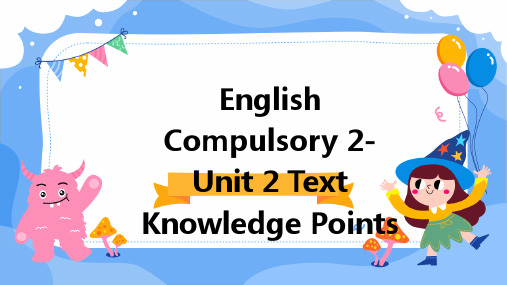
Article structure
"impede" means to hinder or obstruct, usually by creating obstacles or
difficulties. It can be used to describe actions or situations that make it more
Understanding cultural differences
the ability to recognize and understand cultural differences in communication styles, values, and beliefs.
Adaptation to different cultures
grammar.
04
Cultural background knowledge
Introduction to relevant cultural background
The development of English literature
an overview of major works and authors in English literature, including poetry, novels, and plays.
Identify the subject and predicate in a sentence and understand their relationship.
初三英语Unit 2

like — dislike agree — disagree 23. touch 摸
put one’s hand in one’s pocket
appear — disappear believe — disbelieve
22. disrespect —— respect dis + 形容词 副词 名词 动词
4. even though 即使,尽管 = even if
I love my students even though they are annoying. Even if it rains I will go there.
5. all the time 一直 The students sleep all the time.
Nodding one’s head is generally meant to show agreement “yes”, but to Nepalese, Sri Lankans, some Indians and some Eskimos, it means not “yes”, but “no”.
touch one’s head
make the right hand in the shape of a cup and move it up and down in front of mouth
move the right hand back and forth across the stomach
Arab people often greet by kissing on both cheeks; in Japan people greet by bowing, and in the United States, people shake hands to show their greetings.
人教版高中英语必修二Unit2

During the listening process, quickly jot down key information such as person names, place names, numbers, etc.
Understanding the main idea
Pay attention to the beginning and end of the recording material, and understand the main idea of the article or dialogue.
cultural communication
01
Unit Overview and Background
Unit theme and content
Topic
The theme of this unit is "Wildlife Conservation", covering knowledge related to wildlife, the importance of conservation, and the relationship between humans and wildlife.
• Practical application: Try to use newly learned vocabulary in real life or learning to deepen understanding and memory. For example, when writing essays or practicing speaking, try to use newly learned vocabulary and phrases as much as possible.
Unit2Bodylanguage大单元整体教学设计牛津深圳版(广州沈阳通用)八年级英语下册
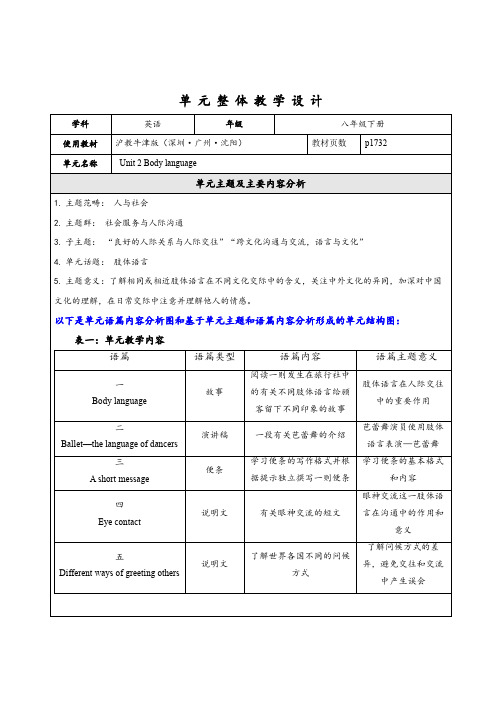
单元整体教学设计表二:单元大观念:主题大观念小观念1:了解肢体语言及其在日常交际中的重要作用小观念2: 了解肢体语言在不同文化背景下的不同含义小观念3:根据已经设定的情境,撰写提醒式便条单元大观念:引导学生了解相同或相近肢体语言在不同文化交际中的含义,关注文化的异同,在日常交际中注意并理解他人输出:撰写一份报告陈述肢体语言在日常交际中的重要性、简单比较中西方对于同一肢体语言的不同含义。
输出:将自己的肢体语言与某位同学的肢体语言进行比较,就肢体语言的使用提出建议。
输出:写一篇演讲稿并演讲,介绍眼神交流在不同国家和地区含义上的区别。
输出:根据已设定的情境,独立撰写一份便条。
Reading:阅读一则发生在旅行社中的有关不同肢体语言给顾客留下不同印象的故事;Grammar:介绍动名词的基本概念和构成以及动名词作主语和宾语的用法。
Speaking:讨论常见姿势的含义Culture corner:了解世界各国不同的问候方式。
More practice:了解眼神交流在不同文化背景下的不同含义。
Listening:了解舞者的肢体语言—芭蕾舞。
Writing:了解便条的基本格式,并撰写一则提醒朋友准时赴约共赏芭蕾舞的便条。
核心素养的综合表现:学生能够运用所学目标语言介绍不同的肢体语言以及其意义;并能评价他人及自己行为举止中得体或需要改进的地方,同时能提出改善的建议。
学情分析(一)自然情况本单元围绕“肢体语言”这一话题,以“肢体语言”的含义及其在日常交际中的重要作用为主线,开展教学活动,了解肢体语言。
符合Module 1 Social munication 这个话题的内容探究,以及八年级学生对知识的汲取需求。
(二)已有基础语言大观念小观念1:围绕语义整合性学习词汇和表达方式小观念2:围绕本单元所学目标语言点,写一封感谢信,感谢寄宿家庭提供的帮助。
肢体语言对于日常交际的影响描述方式语篇结构 了解不同的肢体语言Body language, lady, munication,meaning, gesture, bored, sit up, take place, parttime, hold, welldressed, sigh, matter, later,appearance, remind, impression, towards, make a good impression onballet, neck, cross, nod, shake, sure, contact, eye contact, while, understanding, Asian, Westerner, lie, cause, either,especially, stranger, impolite1. 主题:This is to remind you about…2. 时间和地点:I’ll meet/wait for you + place + time.3. 注意事项: •Don’t forget to… •Remember to … experience…1. Start with a greeting. (e.g. Dear)2. Talk about the topic in the first sentence.3. Give the message clearly in a few words.4. End with a friendly word or phrase. (e.g. Best wishes)。
人教高中英语必修一各单元知识点汇总

人教高中英语必修一各单元知识点汇总Unit 1 Friendship1. Vocabulary: adjectives to describe people's characteristics (e.g. reliable, outgoing, generous, etc.)3. Reading: Understanding the main ideas and details in a reading passage, inferring the meaning of words from context4. Writing: Writing a letter of introduction, using appropriate greetings and closing statements5. Speaking: Discussing qualities of a good friend, expressing agreement or disagreement, expressing preferences Unit 2 English around the world1. Vocabulary: words related to language learning (e.g. fluent, bilingual, etc.), words related to education (e.g. curriculum, instruction, etc.)2. Grammar: Using "used to" to talk about past habits or states, using "would" to talk about past habits, using "will" and "would" to talk about future actions or intentions3. Reading: Understanding different types of texts (e.g. advertisements, news articles, etc.), inferring the purpose or tone of a text4. Writing: Writing an article about language learning, using appropriate structure and language5. Speaking: Discussing the importance of learning English, expressing opinions, giving reasons and examplesUnit 3 Travel journal1. Vocabulary: words related to travel and tourism (e.g. destination, ecotourism, etc.)2. Grammar: Using the present perfect tense to talk about experiences, using the present perfect continuous tense to talk about activities that started in the past and continue in the present3. Reading: Understanding a travel journal entry,identifying the main idea and supporting details4. Writing: Writing a travel journal entry, using appropriate descriptive language and organizing ideas chronologically5. Speaking: Discussing travel experiences, describing places visited, expressing preferences and opinionsUnit 4 Body language2. Grammar: Using the present continuous tense to talk about temporary actions or states, using the present simple tense to talk about general truths or habits3. Reading: Understanding an article about body language, understanding the purpose or main idea of a text4. Writing: Writing a dialogue about a misunderstanding due to body language, using appropriate dialogue format5. Speaking: Discussing cultural differences in body language, interpreting gestures and facial expressions, role-playing scenarios involving body language misunderstandings Unit 5 Nelson Mandela1. Vocabulary: words related to politics and human rights(e.g. apartheid, injustice, etc.)3. Reading: Understanding a biography of Nelson Mandela, identifying key events and milestones in his life4. Writing: Writing a biographical sketch about a famous person, using appropriate structure and language5. Speaking: Discussing the impact of Nelson Mandela's actions, expressing opinions on social justice issues, making connections between historical events and current events Unit 6 Inventors and inventions1. Vocabulary: words related to inventors and inventions(e.g. innovation, patent, etc.)2. Grammar: Using the present perfect tense to talk about achievements and discoveries, using the present perfect continuous tense to talk about actions or states that started in the past and continue in the present3. Reading: Understanding a passage about inventors and inventions, identifying the main idea and supporting details4. Writing: Writing a paragraph about a famous invention, using appropriate descriptive language and providing historical context5. Speaking: Discussing the significance of inventions, debating the ethics of scientific discoveries, predicting future inventionsUnit 7 Teenagers should be allowed to choose their ownclothes1. Vocabulary: words related to clothing and fashion (e.g. dress code, trend, etc.)2. Grammar: Using modal verbs to express possibility, permission, prohibition, etc., using conditional sentences to express hypothetical situations3. Reading: Understanding an argumentative essay on a controversial topic, identifying the author's stance and supporting reasons4. Writing: Writing an argumentative essay on a social issue, using appropriate persuasive language and organizing ideas effectively5. Speaking: Debating the pros and cons of a social issue, expressing opinions and supporting arguments, responding to counterarguments.。
Module1Unit2BodylanguagePeriod3Grammar

Things to remember We often use gerunds after prepositions. Debbie is good at communicating with people. I am looking forward to going to Beijing.
Activitiy
选择适当的选项:
1. Jack practises ______ the piano for two hours every day.
A. play
B. playing
C. to play
D. played
2 I didn’t finish _______ my homework until 11:30 p.m. last
and activities.
Communicating is more than just speaking.
Verb begin
Gerund beginning
communicate communicating
dance
பைடு நூலகம்
dancing
hold
holding
sigh
ishing
Presentation
shake your closed hand/ angry
Let's do
S1: What can resting your head on your hand show? S2: Resting your head on your hand can show that you're bored.
(精品)【双语报】广州最新版本八年级英语下册U2Bodylanguage课件:(第04期)

句型导航Sentence guide Structure analysis [长难句解析]
1. It’s the way you stand and sit. 它就是你的站姿和坐姿。
【解析】本句是一个定语从句,句中省 略了连词that。当the way做先行词,并 在定语从句中做方式状语时,可省略 that。例如:
III.根据句意及首字母提示写单词,完成 句子。 11. I received an invitation from my
cousin but I didn’t acc_e_p_t___it.
3. He told me the latest news. 他告诉了我这一最新消息。
【总结】later用作副词,意为“后来; 以后”,既可单独使用,也可放在时间 段后,常用于一般过去时态。latest是形 容词,意为“最新的;最近的”。late既 是形容词,也是副词,意为“晚(的); 迟到(的)”。
What made you decide to change your job? 是什么使你决定更换你的工作的?
2. You made a good impression on her. 你给她留下了好的印象。
【解析】此句中,make a good impression on sb意为“给……留下好印 象”。例如:
【运用】根据汉语意思,填写相应单词。 6. 你可以保留你的意见,可你必须执行
命令。
You can _h__o_ld__ your opinion, but you have to obey orders.
remind “提醒” 【展示】
1. Can you remind me to buy a bottle of wine? 你能提醒我买一瓶葡萄酒吗?
高中英语真题-高中英语Unit2Grammar导学案新人教版必修2

高中英语真题:高中英语Unit2Grammar导学案新人教版必修2英语中的分词有两种:现在分词和过去分词,兼有动词、副词和形容词的特征。
在句子中可以作定语,表语,宾语补足语和状语。
考点一现在分词的基本形式1.现在分词的一般式一般式所表示的动作与谓语动词所表示的动作一般同时进行。
如:They came in talking and laughing.他们谈笑着进来了。
Seeing nobody there,he turned off the lights.看到没人在那,他就把灯关了。
2.现在分词的完成式完成式表示的动作发生在谓语动词的动作之前。
如:Having cleaned the desks,we began reading.擦完了桌子后,我们便开始看书。
Having been surrounded for a month,the enemy had to give in.被包围一个月后,敌人不得不投降了。
3.现在分词的被动语态现在分词的被动语态分为一般式和完成式两种。
一般式表示一个被动动作正在进行。
或与谓语表示的动作同时进行。
完成式表示一个被动动作在谓语表示的动作之前已经完成了。
如: The building being built will be our school library.正在建造的那座大楼将是我们的校图书馆。
[例] ____ ,we were taken to Bee the library.A.We had been shown the classrooms B.Being shown the classroomsC.Having been shown the classrooms D.Having shown the classrooms[解析] 句意:我们先被领着看了教室,又被带去看图书馆。
首先,句子主语与show之间构成被动关系,因此可排除D项;A项为句子,需要加连词连接两个分句;B项相当于While we were being shown the classrooms,显然与后面的时间有冲突,故只有C项正确。
- 1、下载文档前请自行甄别文档内容的完整性,平台不提供额外的编辑、内容补充、找答案等附加服务。
- 2、"仅部分预览"的文档,不可在线预览部分如存在完整性等问题,可反馈申请退款(可完整预览的文档不适用该条件!)。
- 3、如文档侵犯您的权益,请联系客服反馈,我们会尽快为您处理(人工客服工作时间:9:00-18:30)。
1.学案未完成的习题课下继续完成。
2.用动名词造10句话,五句动名词作主语, 五句动名词作宾语。
mind/ open the door
Would you mind opening the door?
Certainly not.
• The man enjoys smiling.
• The boy finishes doing the homework.. object
We often use gerunds after these verbs. enjoy imagine finish practise mind
1 2 3 4 5 6 7
She is tired of ________ the dirty air in the city centre. She keeps on ________ to school instead of _________ a bus. He finally gave up ________. She is used to ________ a handkerchief instead of a tissue. She was interested in ________ the puzzle. She looks forward to ________ from her new e-friend. She is good at __________ party activities.
Oxford English
Unit
2
Body language
1.了解动名词的含义,掌握动名词的构成
2.掌握动名词的用法:作主语和宾语
Check your homework with your classmates.
begin __________ beginning
run __________ running
communicating communicate ____________ play _________ playing dancing dance ___________
hold _________ holding lie _________ lying stop __________ stopping swimming swim ___________ carrying carry __________
S1: What does this body language show?
S2: V-ing … shows that…
• Smiling shows that you are happy. • sighing shows that you are unhappy • Dancing is her favourite hobby. subject
enjoy/ ride bikes
What does the man enjoy doing? The man enjoys riding bikes.
enjoy/ read books
What does the boy enjoy doing? The boy enjoys reading books.
be fond of be good at be interested in be tired of be used to give up keep on look forward to think of
S1: What is the girl good at?
S1: What is the girl interested in?
Think of outdoor activities as many as you can
S1: What is your favourite out door activity? S2: V-ing … is my favourite out door activity.
Smiling shows that I am happy. Sighing shows that I am unhappy.
Look at the pictures and complete the sentences with gerunds.
1. I like
_______.
2. ______ damages your health.
3. ______ builds your imagination.
4. ________ is fun.
finish/ do the homework
What _______________________? does the girl finish doing She _________________________. finishes doing the homework
finish/ eat
enjoy/ sing
What does the boy enjoy ______? doing enjoys singing. The boy ______
enjoy/ dance
doing What does ____ she enjoys _____ _____? dancing She enjoys _______.
S2: She is good at skiing.
S2: She is interested in playing chess.
Compl the verbs in the box in the -ing form.
breathe do hear organize smoke take use walk
practises playing the piano The girl______________________.
practise/ speak English
does the boy___________? What ____ practise doing
practises speaking English The boy ______________________.
We often use gerunds after prepositions.
Debbie is good at communicating with people. I am looking forward to going to Beijing.
We often use gerunds after these phrases.
What ________________________? does the boy finish doing
finishes eating. He _______________.
imagine/ be a singer
does the boy imagine What ____________________ being? imagines being a singer. He ______________________.
practise/ paint
doing What _____ _____ ______? does the girl practise painting The girl practises ______ ______.
practise/ play the piano
practise doing What ______ does the woman___________?
